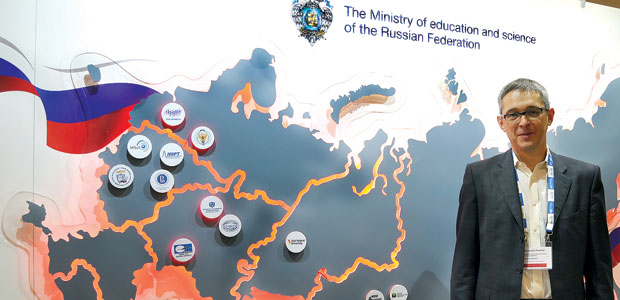
Source: Alamy
Russia is funding a transformative programme to establish a notable presence for its universities in global rankings, explains Alexander Povalko.
Project 5-100 is a recent initiative from President Vladimir Putin and the Russian Federation government. The project was launched in 2013 to support the best universities in Russia, with a desire to see at least five of them enter the top 100 of the leading global university rankings by 2020.
However, the ambition to reach the top of the ranking is not the primary aim of the project. The rankings serve only as important indicators, among many others, to measure university performance. Project 5-100 is a comprehensive academic excellence initiative that unites top-tier Russian universities behind the goal of deep transformation of the institutions according to the best international models and practices.
This transformation has three key objectives. First, we want to change the university environment, upgrading it to a world-class level by creating: extensive English language communications; a large choice of international educational programmes; comfortable campus accommodation and services.
Second, we want to reform our university research: to join in partnership with leading international research teams and to form such teams ourselves; to increase our presence in highly cited international research journals; to develop active collaboration between universities and business and industry; and to increase the demand for our technology transfer in the global market of innovative products.
Third, we want to increase the attractiveness of our universities in order to recruit talented international faculty and students, to promote our education and research, and to make the best Russian universities well known abroad.
To achieve these objectives, we implemented many international practices: for example, all Project 5-100 universities have set up boards of trustees, which represent stakeholders outside the institution. These steering boards appoint university presidents, approve their financial and strategic plans, and oversee whole university performance. Other practices that have been introduced include ensuring the reform of university strategic development plans, management and autonomy.
The origin of the Project 5-100 concept is worth a mention. Russia has been proud of its higher education system: over the past 50 years, it belonged among the top 10 countries and attracted international students. Russian scientists actively participated in discoveries that shaped the modern world. With such a strong history, the first appearance of the Times Higher Education World University Rankings 10 years ago was quite a shock for our leading universities. Should we blame the rankings or track the problems that they reflected? We chose the second option.
We have tried to incorporate the best from the concepts and experience of the Chinese 211 and 985 Projects, the South Korean Brain Korea 21 Programme, the Japanese Global 30 Project, the German Excellence Initiative and many others. The best international experts in creating world-class universities were engaged to create the Project 5-100 concept. We formed the Project 5-100 Council, chaired by Dmitry Livanov, the minister of education and science, and appointed foreign members to the council, representing the leadership of the best universities.
After analysis of the university strategic development programmes submitted within the all-national Project 5-100 competition, the council chose 15 winners and came to a firm conclusion: there is no universal recipe that all institutions can follow to achieve world-class status. Each university will develop their individual road map of development up to 2020.
Funding for the project amounts to about €1 billion (£790 million) up to 2016, and universities are required to match-fund schemes that aim to overcome the isolation of the Soviet period and work to become an essential part of the global academic community.
The universities participating in the project are all very different, but they have the same aims: to be the best in Russia in some particular field; and to have a great potential in that field at the global level.
Historically, mainstream research in Russia has been concentrated in the research institutions of the Russian Academy of Sciences and in a few other academies, separated from universities, as well as from the needs of a high-tech economy. Now we are supporting the merging of research institutions with the Project 5-100 universities, building technological belts around them.
Talented international students want to study in universities where new knowledge is generated and demanded by the labour market, and where students can participate in cutting-edge research and entrepreneurship or launch their own start-up projects.
Most international faculty are looking for the same thing. We welcome them to Russia to our Project 5-100 universities.
Alexander Povalko
Deputy minister of education and science of the Russian Federation
Register to continue
Why register?
- Registration is free and only takes a moment
- Once registered, you can read 3 articles a month
- Sign up for our newsletter
Subscribe
Or subscribe for unlimited access to:
- Unlimited access to news, views, insights & reviews
- Digital editions
- Digital access to THE’s university and college rankings analysis
Already registered or a current subscriber? Login